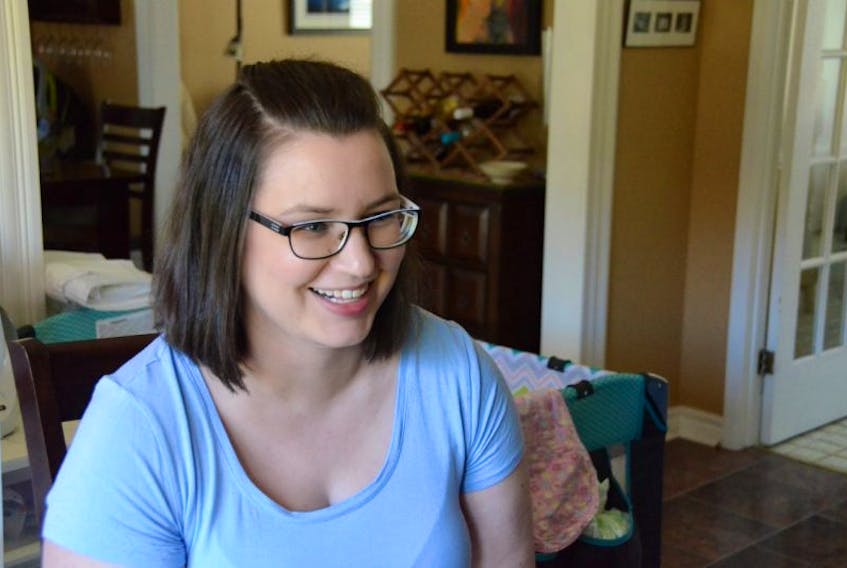
Hollahan was objecting to the listening component of the province’s English 3201 public exam, worth 10 per cent of the final exam grade. He said the accommodations being offered students with a hearing impairment — including having someone read passages to the students in a private room — would not put them on a level playing field.
Breen Hearn had actually spoken out against the same exam requirement while she was in high school, in her final year at Gonzaga High in St. John’s in 2005. For her exam, she was read to in a private room, before answering the required questions.
While she used hearing aids and was able to lip-read, she said having to watch the reader’s face meant she could miss things if she looked down to make notes. She also points out that lip-reading can be impossible in some cases due to anything from poor visibility of the other person’s face, lighting or thick accents altering mouth movements.
The CNIB estimates even expert lip-readers only pick up about 20 per cent from lip-reading alone at full focus.
While students are also offered sign language, some students with hearing impairments don’t know the language, are not part of the deaf community or are not familiar with deaf culture.
When Breen Hearn fought the exam requirement, she thought she had won.
“After the fact it was removed, because it is discriminatory. So yay! You know? We won the fight. Let’s put it to bed. Let’s move on to other challenges,” she said. “Apparently not.”
The requirement has been returned to the exam, with no ability for hearing impaired students to opt out. That led he to write to a Letter to the Editor, published in The Telegram in 2016, to raise the issue again.
After seeing Hollahan’s story, she wrote Education Minister Dale Kirby, to again ask for change.
“Shouldn’t we be able to move on as a society and not have this same fight over and over again? It’s really disheartening. It really is,” she said.
The Department of Education is responsible for public exams and told The Telegram the exam segment is to evaluate response to non-written text, as the students would be at points during the year.
“The department’s position is supported by Atlantic Provinces Special Education Authority, the leading authority of support services for deaf and hard of hearing students in Atlantic Canada,” stated an emailed response to questions. It noted deaf and hard of hearing teachers, and student support specialists, were involved in the development of the standards.
Related letter: Change to exam format is unfair
Tired of repeat battles
At the Canadian Hard of Hearing Association in Newfoundland and Labrador, executive director Leon Mills was onside with Breen Hearn when she was a student, speaking on the issue on Roger’s “Out of the Fog.”

He said he has asked why the exam element was brought back.
“I’ve never heard a straight answer. They just feel, well, it’s part of the curriculum, being able to listen, so they’re testing your ability to listen,” he said.
He said having to repeat battles has sadly been a part of life in Newfoundland and Labrador, and something he attributes to a lack of education and a need for a greater shift in attitudes.
At his office, he walked over to the light switch on the wall, flicking off the lights.
“I went from completely hearing to completely deaf in that instant,” he said. He was in his late 20s at the time, and his fourth year of university.
In his case, the hearing loss was tied to a viral attack on his autonomic nervous system. He recovered some hearing, graduated and began work as a teacher. Later, he moved into advocacy work with the association.
And he has helped the organization grow from an entirely volunteer group with restricted services to one with 11 staff, a $1-million annual operating budget and library of assistive devices.
But he’s hit some lows, and considered giving it up in recent years, based on having to fight the same fights time and again.
“For the person who lives with a disability, it often demeans you as a person. You feel inadequate, incomplete. There’s something wrong with you. You’re a burden. It affects your self-esteem and how you view the world,” he said.
But, is inclusion overall pushing that? Or is it working as a school policy?
“For the most part they’ve been doing a good job as far as we can see,” he said.
On William Sears and Ranee Panjabi
In fall 2015, Memorial University of Newfoundland student William Sears went public after a confrontation with professor Ranee Panjabi over the use of an assistive listening device. The case was raised repeatedly by interviewees, for The Telegram’s accessibility and inclusion series.
Canadian Hard of Hearing Association in Newfoundland and Labrador executive director Leon Mills said it was an unfortunate case.
He has been watching the followup and the university’s review of the Glenn Roy Blundon Centre, also offering his time to a university committee focused on accommodations.
There is a draft policy — a possible revision on the university’s existing accommodations policy — coming in the fall, he said.
“I told the committee and I told the president, I said we wouldn’t be in this pickle if you had followed the policy in the first place. There was nothing wrong essentially with MUN’s accommodations policy. It’s a very good one. It’s just they didn’t follow the policy,” he told The Telegram.
The Newfoundland and Labrador Human Rights Commission is still reviewing the interaction between the university and Sears, so the university and commission are not commenting on the matter.
On more recent work relating to accessibility and inclusion, the university released the report on the review of the Glenn Roy Blundon Centre in November. The report, by former Dean of Education Alice Collins, provided recommendations for improvements to improve student supports.
A progress report released in March noted working groups were formed for follow-up. A renovation to the support centre is to be completed by fall, an update of the centre’s website is in the works, plus a digital upgrade is coming to help the centre better gather and track records, generate accommodation letters and schedule appointments.
A review of the Glenn Roy Blundon Centre
MORE IN THIS SERIES:
Mount Pearl man calls for Inclusion Now
Inclusion Now: Accessibility starts at home
Inclusion Now: NL Housing minister wants more accessible units
Inclusion Now: Accessible tickets to ride
Inclusion Now: Downtown could become more accessible
Inclusion Now: Welcoming classrooms
Inclusion Now: Students, past and present, object to listening test
Inclusion Now: Human rights complaints in N.L. often disability-related









